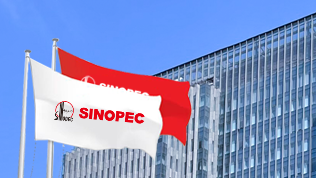Sinopec integrates the requirements for ecological and environmental protection into all the links related to corporate production and operation; promotes the "green enterprise action plan"; implements clean production, develops a circular economy; and promotes the in-depth implementation of a green and clean development strategy, striving to develop into a global leader in the clean energy and chemical industry.
Promoting the green enterprise initiative
In fulfilling the "Green enterprise action plan", Sinopec has implemented a green enterprise and green grass-roots evaluation system in its major business sectors, achieving remarkable results in clean energy supply, resource and energy utilization, pollutant emission reduction, and carbon emission reduction. In 2022, 12 enterprises were honored as "Sinopec Green Enterprises", with all green enterprises reviewed. At present, all its affiliates have gone green, and so have more than 19,900 grass-roots entities.
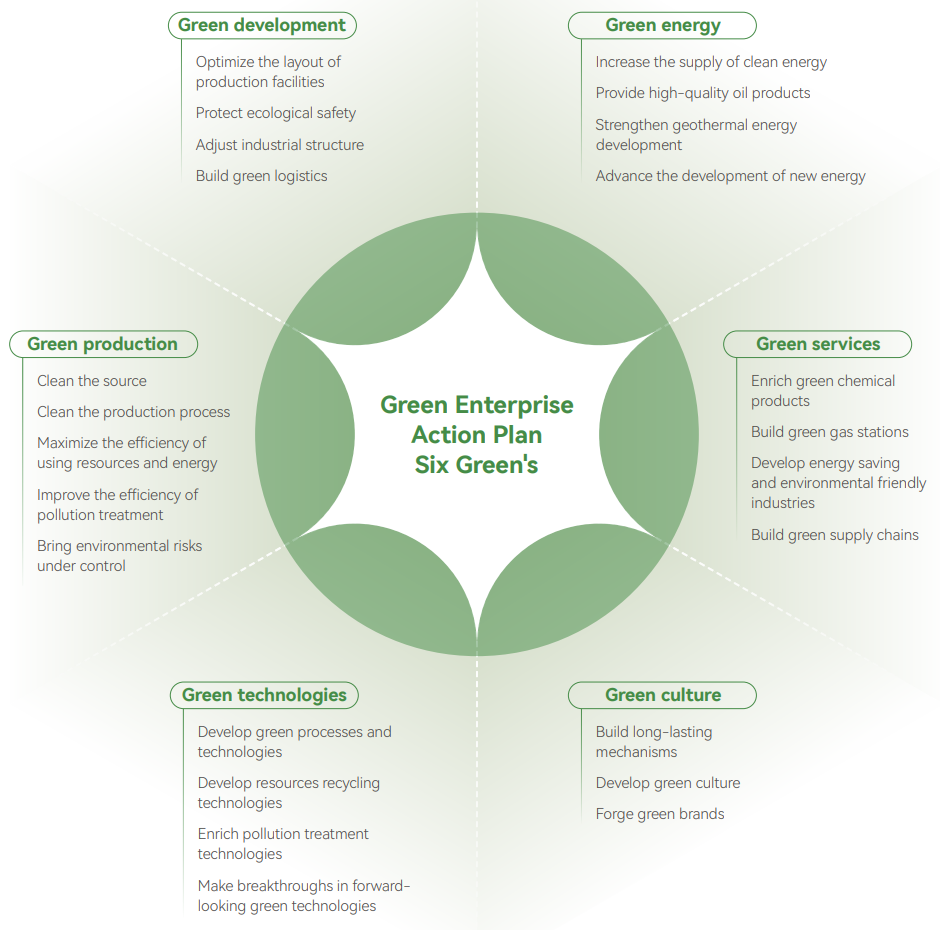
Implementing cleaner production
In accordance with the Law on the Clean Production Promotion and the Plan for Implementing Clean Production During the 14th Five- Year Plan Period, Sinopec has replaced toxic and harmful raw materials, expanded the promotion and application of green technology and environmentally friendly technology, and reduced the emission of "three wastes" and pollutant emissions in the consumption and use processes, thus reducing the impact of corporate operations on the environment, from raw material procurement to consumption.
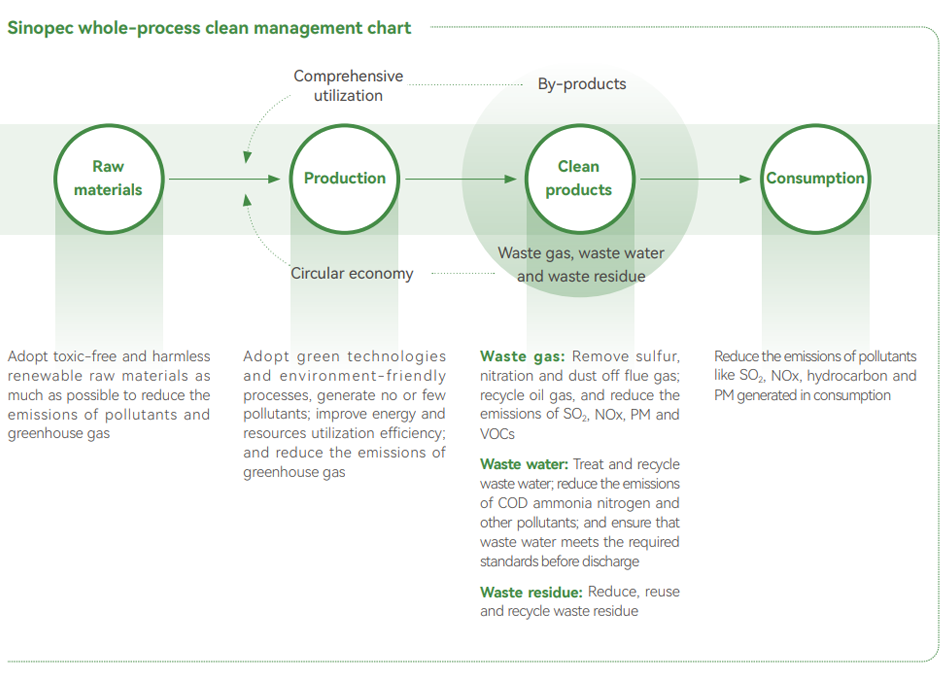
Promoting emission and pollution reduction
Air pollutant emission management
Sinopec has abided by national and local laws and regulations on air pollution prevention and control, and reduced emissions by adjusting the energy consumption mix, increasing the use of clean energy, and improving clean production processes and technologies. In so doing, it has followed the national requirements to win the battle against pollution, defended the blue sky, and taken up a comprehensive campaign against air pollution in autumn and winter. Besides, it has launched emergency plans to address heavy pollution, and adjusted production and pollution prevention facilities, in a bid to meet the targets for air pollution response and emission reduction. Besides, based on grid-based monitoring and traceability of VOCs, it has made continued efforts to treat volatile organic compounds, done odor remediation, and included ozone pollution prevention and control in it special actions, marking the attainment of governance goals outlined in the Order No.1 of the General Manager. Separately, it has also issued the Sinopec Plan for Environmental Protection Improvement 2021-2023, and implemented stricter concentration standards to reduce emissions of NOx, VOCs and other pollutants, and promote the implementation of projects for emission reduction. In 2022, the company logged a 99.9% compliance rate in overall exhaust gas emissions, with the total emissions of sulfur dioxide and nitrogen oxides sliding by more than 4% year-on-year.
Water resources management
Sinopec has steadily reduced the total amount of fresh water consumed by improving its water consumption structure, saving water from sources, and replacing fresh water using unconventional water resources. In 2022, water consumed for the company's industrial production slid by 1.1% from a year earlier. In the Selection of Key Water Efficiency Leaders in 2022 organized by the Ministry of Industry and Information Technology and other three departments, Qingdao Refining & Chemical, Tianjin Petrochemical, Qingdao Petrochemical, and Zhenhai Refining & Chemical was honored as "Water Efficiency Leaders" in the oil refining industry; Sinopec Great Wall Energy And Chemical (Ningxia) was listed as a "Water Efficiency Leader" in the modern coal chemical industry; and Sinopec-SK (Wuhan) Petrochemical, Zhenhai Refining & Chemical, Yanshan Petrochemical and Shanghai Secco won the title of "Water Efficiency Leader" in the ethylene industry.
In accordance with national and local policies, regulations, and standards for the prevention and control of wastewater pollution, Sinopec has implemented important national instructions on the prevention and control of water pollution in key river basins such as the Yangtze River and the Yellow River. With the implementation of enterprise-specific projects for sewage emission reduction in key enterprises, it has made headway in improving the management of rainwater and sewage systems in refining & chemical enterprises. In so doing, it has installed online environmental monitoring facilities, and adopted early warning and alarm measures, as well as prompt operation of production equipment and management of environmental protection facilities, to meet the sewage discharge standards. In 2022, the company's wastewater discharge went down by more than 6% year-on-year, 100% of the effluent met the standards, and the total COD and ammonia nitrogen emissions dropped by more than 8% from a year earlier.
Solid waste management
In accordance with the Law on the Prevention and Control of Environmental Pollution by Solid Wastes, Sinopec is promoting the reduction, recycling and hazard-free treatment of solid wastes, in a bid to achieve comprehensive management and utilization of solid wastes. In building a "waste-free group", 12 enterprises have been included in the pilot demonstration, steadily promoting the establishment of the government-enterprise "one network" information sharing platform for the whole-process management of hazardous wastes and solid wastes. By strengthening the solid waste management during the construction of engineering projects; inspection and maintenance of Refining & Chemical enterprises; and drilling construction, Sinopec has built such demonstration projects such as Tianjin Nangang Ethylene and Hainan Refining & Chemical. In 2022, it registered a 100% compliance rate in solid waste disposal.
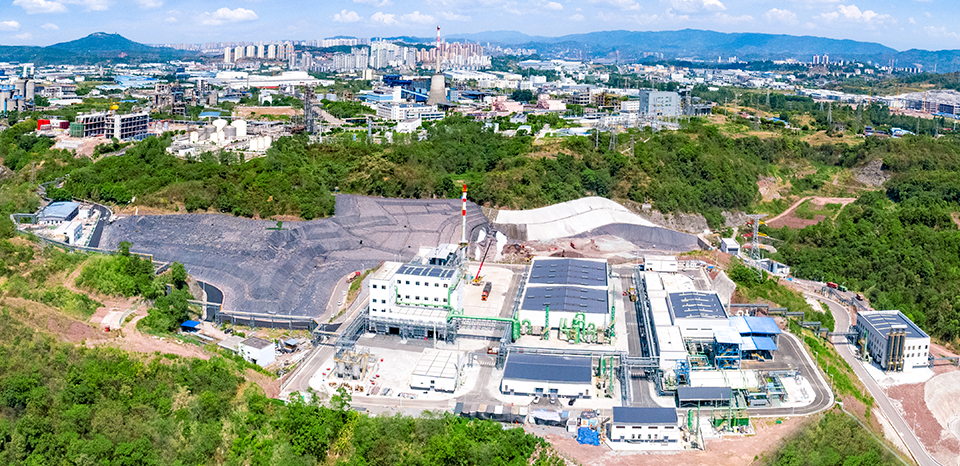
Sinopec Southwest Hazardous Waste Disposal Center can dispose 62,400 tons of hazardous wastes and 95,600 tons of general solid wastes per annum, making it the most comprehensive and largest industrial waste disposal center in Southwest China
Soil pollution control
In pursuing pipeline integrity management, Sinopec has organized relevant enterprises to study corrosion and repair of crude oil pipelines, implemented interpenetration of pipelines and replacement of old pipelines, worked with local governments to combat theft of oil by drilling, and further maintained, tested and renovated oil transmission equipment. In addition, it has beefed up environmental risk management and control to ensure that no materials and sewage are discharged into the outside environment. In terms of special inspection of soil hazards checking and monitoring in the key supervised enterprises, it has filed applications for 14 national soil source control projects and five pilot projects featuring a combination of production and pollution control. In 2022, no oil spill-related environmental events occurred at the group company.
Groundwater pollution control
Sinopec attaches great importance to the prevention and control of soil and groundwater pollution risks. For this purpose, it has established a long-term monitoring mechanism, implemented a soil pollution hazards investigation system and bolstered the enterprise's self-monitoring requirements. Besides, it is carrying out research and application of the whole-process soil and groundwater pollution prevention and control technologies to improve the system in this regard.
Noise control
To meet the new noise law requirements and control radiation, Sinopec consistently promotes the noise pollution control in the whole process of production and operation, and carries out special investigation and rectification of noise, and radiation pollution control and management, with a focus on controlling noise pollution by adopting improved production facilities, giving priority to low-noise processes and equipment, building sound barriers, implementing noise monitoring and information disclosure, and increasing R&D of noise pollution prevention technologies and personnel training.
Developing a circular economy
To develop a circular economy, Sinopec recycles water resources and solid wastes, and promotes waste heat recovery and waste gas recycling, as well as oilfield associated gas recovery, improving the comprehensive utilization efficiency of resources.
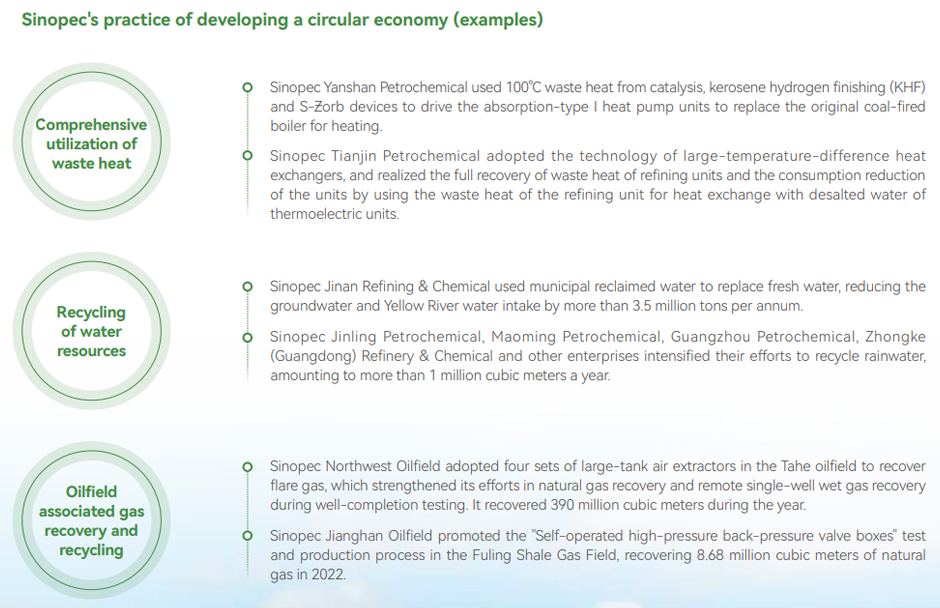
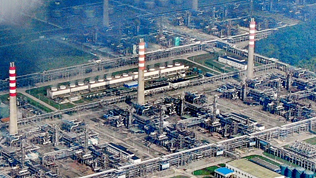



 Address
Address Post code
Post code Tel
Tel 京公网安备11010502035639
京公网安备11010502035639 
